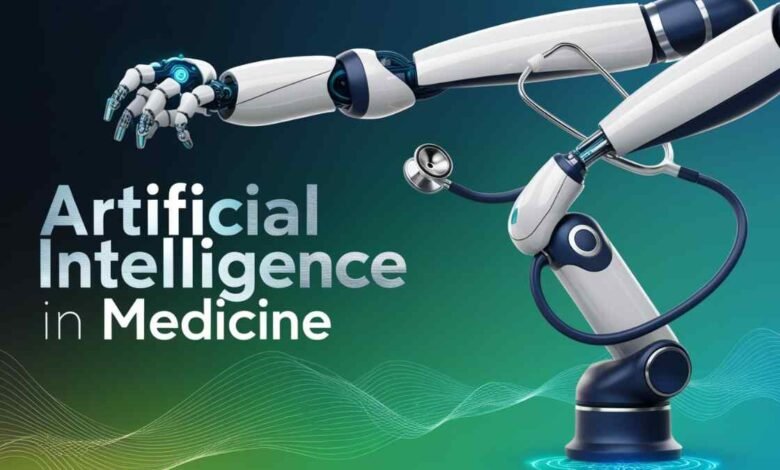Artificial Intelligence in Medicine: How AI is Improving Patient
Artificial Intelligence in Medicine

Artificial intelligence in medicine by providing solutions to the ancient challenges that were partly insurmountable. From improved diagnostics to predictive patient care, AI has emerged as the Swiss knife for modern medicine. This article goes into details with key applications and their impact.
1. Machine Learning in Healthcare
Machine learning (ML) is the gateway through which AI has progressed with regard to healthcare applications, delimiting its boundaries in diagnostics, treatment plans, and monitoring.
Enhanced Diagnostic Accuracy
The ML algorithm screens huge data sets to try to identify patterns that could have easily escaped any human clinician’s attention. For instance, AI-based systems can identify early-stage cancers, which would have remained otherwise unnoticed because the abnormalities in the images at this stage are too minute. Early intervention at such stages can save countless lives.
Accurate Treatment Plans
Analyzing patient histories, genetic profiles, and lifestyle data, ML helps doctors make individualized treatment plans. It will enhance the effectiveness of the treatment and eliminate side effects, and each patient will have an individual health experience.
2. Predictive Analytics in Medicine
A predictive analytics approach uses AI to predict medical outcomes, hence making proactive health strategies possible.
Risk Assessment and Prevention

AI predictive models recognize potential patients who may develop chronic conditions such as diabetes or heart disease. Early diagnosis helps physicians to advise lifestyle changes or preventive treatments which reduce complications in the long run.
AI in Hospital Resource Management
AI will help the hospitals predict the rates of admission and resource consumption during flu seasons. This will enable them to arrange resources in a better way and thus reduce the burden from healthcare workers.
3. AI and Changing The Medical Imagining Equation
In totality, AI increases the chances of making accurate diagnoses. It helps patients plan their lifestyles and offers essential suggestions to the patient for the avoidance of future complications.
Challenging Diagnosis
Artificial intelligence scans any kind of CT or MRI and X-rays much faster and more accurately than a human. For example, AI imaging tools may identify fractures, tumors, or infections that would otherwise be missed in a manual review.
Minimizing Diagnostic Errors
AI minimizes human bias in image interpretation through incomparable unbiased analysis and a systematic conclusion. This is very true in potentially fatal conditions, which requires accurate diagnosis.
4. Clinical Decision Support Systems
CDSS utilizes AI to assist healthcare professionals to make data-based decisions.
Real-Time Recommendations
In CDSS technology, the patient’s information is analyzed in real-time, ensuring evidence-based recommendations towards a correct diagnosis and treatment. This ensures decisions are produced in conformance with the best current available medical guidelines and research.
Improving Workflow Efficiency
It assists with streamlining decision-making procedures for clinicians, thereby reducing their cognitive burden and allowing them ample time to care for patients. The time taken for diagnosis and treatment of diseases is also reduced.
5. NLP in Healthcare
Automated Medical Documentation
NLP tools extract meaning information from clinical notes, EHRs, and patient records, saving significant amounts of time that healthcare providers spend on non-caregiving tasks.
Improving Patient Communications
AI analyzes doctor-to-patient consultations to extract important patient health information for the purpose of proper documentation, thus improving the quality of communication with patients, hence improving patient satisfaction.
6. AI Applications in Drug Development
AI accelerates what used to be a slow and costly process of discovering new medicines
Lead Optimization
Like chemical compound information, AI much faster identifies better leads from millions of drug candidates than any human does, therefore potentially saving years of research development.
Drug Predictive Efficacy
AI models predict interactions of drugs with particular diseases, so that the most promising candidates get more attention, and on-the-field failures can be avoided.
7. AI in Distant Patient Monitoring
Distant Patient Monitoring is centered on AI for continued outside-of-hospital care
Analysis of Real-Time Health Data
AI wearable devices observe the heart rate, blood pressure, and glucose of the patient. This enables real-time updating the healthcare professionals to take interventions without delay if there is any abnormality noticed.
AI and Chronic Disease Management
For chronic conditions like hypertension and diabetes, AI would reveal health patterns and advise lifestyle modification for enhanced disease control.
8. Benefits of AI in Medicine
AI provides transformative benefits: healthcare outcomes are better and more efficient .
Improved Diagnostic Effectiveness

AI-based systems can analyze data with exceptional accuracy so that diagnoses are not only much more rapid but also more reliable.
Healthcare Provider Cost Reduction
With the elimination of mundane work, coupled with optimized workflows, AI delivers savings in operational costs, making healthcare more affordable for providers and patients alike.
Faster Processes Related to Treatment
AI-driven insights speed up diagnosis and treatment planning, ensuring patients receive timely care, especially in emergency cases.
9. Challenges and Ethical Considerations
The integration of AI in healthcare isn’t without challenges.
Data Privacy
Healthcare data is sensitive, and breaches can have serious consequences. Ensuring compliance with the regulations about data protection, such as GDPR and HIPAA, is necessary.
Algorithmic Bias
Bias in AI models which tends to stem from limited or biased training data leads to inequitable healthcare outcomes. This must be eliminated as an ongoing process.
Cost of Implementation is High
Small health care facilities will find the infrastructure and training needed to implement AI technologies too expensive, thus increasing the disparity in care quality.
10. Scope of AI in the Future of Medicine
Exciting times ahead, with the future of AI in medicine as genomics, telemedicine, and robotics are bound to take healthcare quite several notches higher. While this technology continues to advance, more efficient partnerships between healthcare professionals, tech innovators, and policymakers shall be the way to go and help unlock AI’s potential.
Conclusion
Artificial Intelligence in Medicine: the cutting-edge technology, much more than that-transformatory power shaping healthcare. AI can boost diagnostic accuracy and personalize treatments along with efficiency gains-all leading to better outcomes not just for patients but also for providers. Its misuse in sneaky ways, including data privacy and algorithmic bias, has led many folks to caution against ethics.
FAQs
Q1: In medical imaging, what is AI’s role?
AI augments medical imaging with abnormalities quickly and accurately, minimizes diagnostic errors.
Q2: What is the potential benefit to patient care from predictive analytics?
Predictive analytics can identify patients at risk for a variety of conditions, which allows for early intervention and better health outcomes.
Q3: Can AI “replace” doctors?
No, AI is meant to complement, assist healthcare providers-not replace them.
Q4: What are the barriers of AI in healthcare?
Some of the challenges facing AI in drug discovery and development include data privacy issues, algorithm bias, and a significant cost of implementation.
Q5: What does AI do to support drug discovery?
AI can fast-track drug discovery by identifying potential compounds and predicting their effectiveness, saving time and resources.

